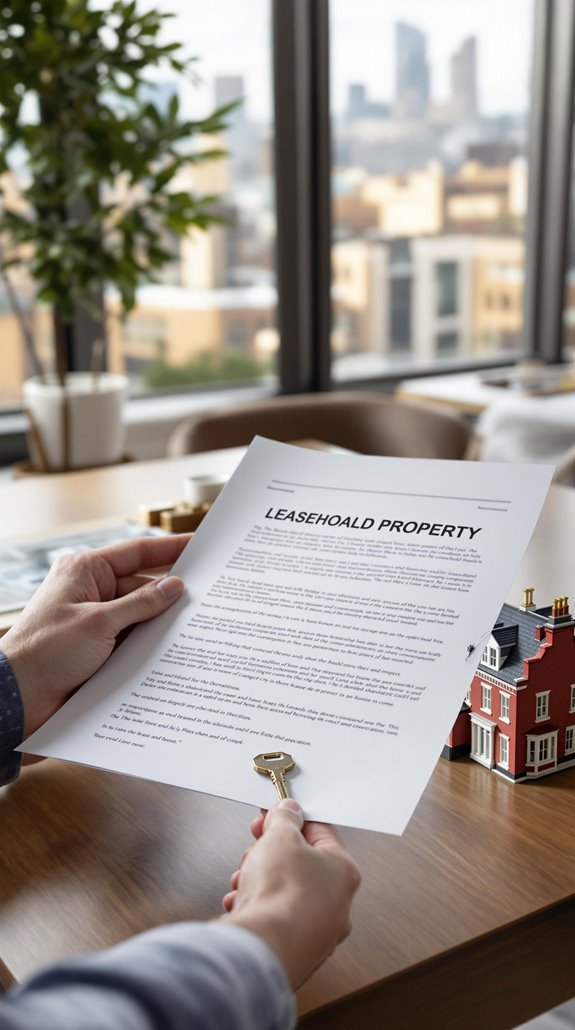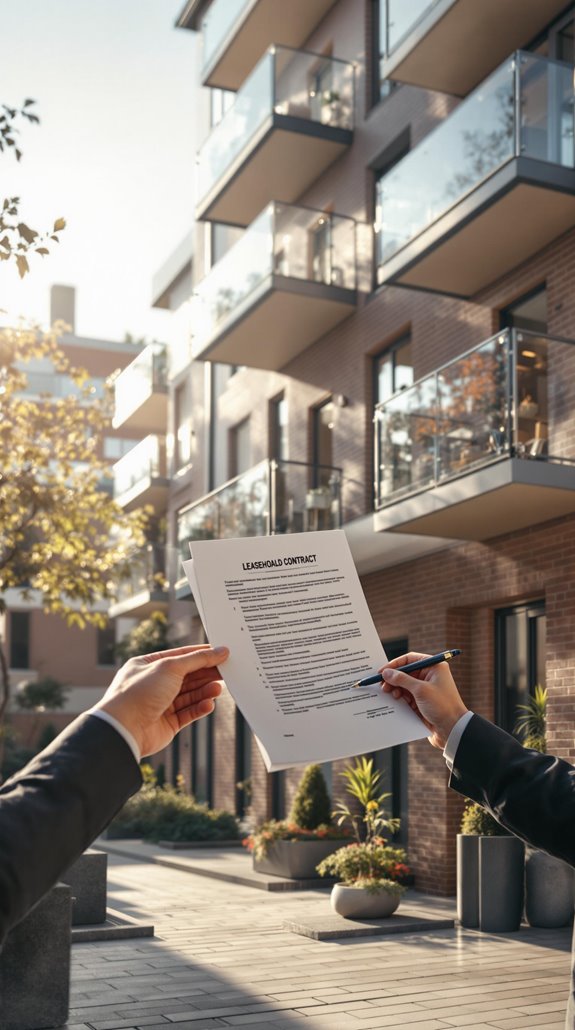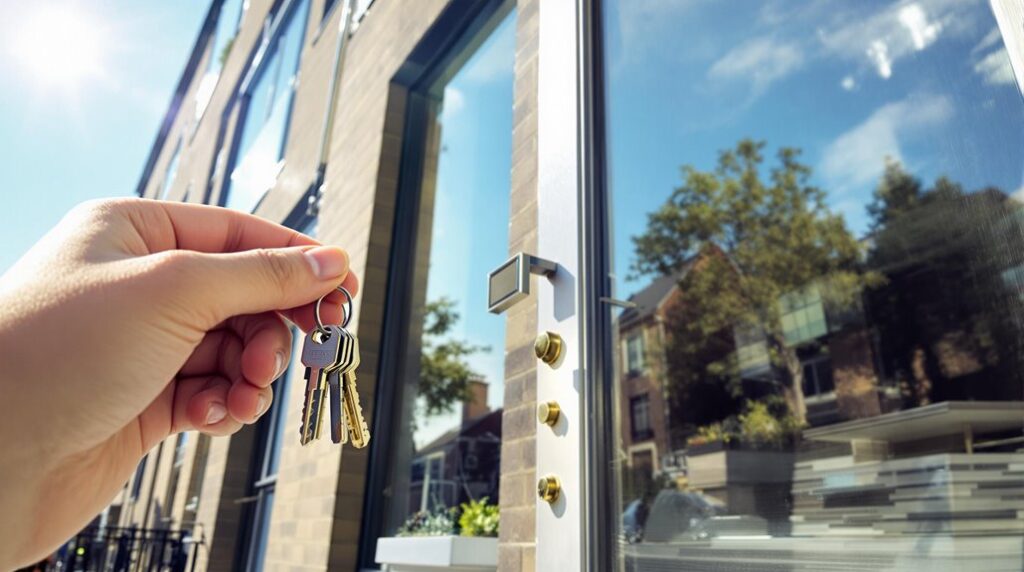I’ll guide you through the essential aspects of leasehold conveyancing that can make or break your UK flat purchase. While buying a leasehold property involves more complexity than freehold transactions, understanding the key processes and potential pitfalls doesn’t have to overwhelm you. The difference between a smooth purchase and a costly disaster often comes down to knowing what documentation you’ll need, which legal requirements you must meet, and how to navigate the unique challenges that emerge when you’re not buying the land beneath your feet.
Key Takeaways
- Leasehold transactions take 12-16 weeks and require extensive documentation including lease agreements, service charge accounts, and landlord safety certificates.
- Budget £1,586 average conveyancing costs plus potential £8,000-£12,000 lease extension fees if under 85 years remaining on the lease.
- Choose solicitors with specialized leasehold expertise and Law Society accreditation to handle complex lease terms and multiple party coordination.
- Request lease details immediately and maintain regular contact with managing agents to prevent delays that affect 37% of transactions.
- Discuss ground rent escalations and service charges upfront to avoid surprises, as leasehold transactions fall through 4% more often than freehold.
Understanding Leasehold Property Ownership in the UK

When purchasing a flat in the UK, you’re likely buying a leasehold property—a system where you’ll own the exclusive right to occupy your unit for a fixed period (typically 90-999 years) while the freeholder retains ownership of the land and building structure. It’s essential to stay aware of planning permissions to avoid potential complications with your leasehold property.
This arrangement makes practical sense for flats since shared areas like hallways, lifts, and gardens require coordinated maintenance. As a leaseholder, you’ll handle internal repairs independently but need freeholder consent for structural changes.
You’ll face ongoing financial obligations including ground rent payments and service charges covering communal area upkeep. The lease contains covenants that govern your property use, and disputes typically resolve through property tribunals.
Understanding these fundamentals helps you navigate the complexities ahead and make informed decisions throughout your purchase journey. Leasehold properties can be bought and sold similarly to freehold properties, giving you flexibility in the property market.
Key Differences Between Leasehold and Freehold Conveyancing
The conveyancing process differs considerably between leasehold and freehold purchases, affecting everything from legal checks to completion timelines. When you’re buying freehold, I’ll focus on standard property searches and title verification. However, leasehold conveyancing requires extensive additional checks including lease terms, service charge histories, and ground rent obligations. To find affordable conveyancing solicitors, it’s essential to compare quotes that may help reduce your legal costs.
You’ll face higher legal fees with leasehold due to this complexity. I must scrutinize management company accounts, major works provisions, and your rights regarding modifications. Freehold gives you complete control over property changes, while leasehold often requires freeholder consent for alterations.
Mortgage implications also differ markedly. Lenders impose stricter criteria on short leases under 80 years, potentially limiting your financing options. Freehold purchases typically complete faster since there’s less documentation to review and fewer parties involved. Additionally, leaseholders may encounter restrictions on business operations that don’t affect freehold owners.
Timeline Expectations for Leasehold Transactions
Understanding leasehold transaction timelines becomes essential since these purchases typically require 12-16 weeks from offer acceptance to completion, considerably longer than standard freehold deals. I’ll break down what you can expect during your leasehold conveyancing journey.
The draft contract phase often creates the biggest delays, taking anywhere from 2-10 weeks depending on lease complexity. Your conveyancer must review additional documentation like management packs and service charge accounts that aren’t required for freehold purchases. It’s crucial to be aware of the implications of the Landlord and Tenant (Covenants) Act 1995 to understand the rights and responsibilities involved in your lease.
Leasehold transactions average 8-15 weeks compared to freehold’s typical 8-10 weeks. You’ll face potential delays from managing agents, lease defects requiring indemnity insurance, and third-party dependencies that don’t exist with freehold properties. Chain-free sales can potentially complete within three months, offering a more predictable timeline.
I recommend appointing a specialist leasehold conveyancer early and requesting management information immediately to minimize delays.
Essential Documentation Required for Your Purchase
Since leasehold purchases involve considerably more paperwork than freehold transactions, you’ll need to gather extensive documentation beyond standard property purchase requirements. I’ll break down what you must collect into key categories.
Start with identity verification: your photo ID, recent utility bills, and proof of address. You’ll need the Land Registry title and evidence of the property’s pre-February 2022 market value. Conducting a property survey can reveal potential issues that may affect your investment.
The lease documentation is essential—obtain the full lease agreement, leaseholder deed certificate, and landlord’s building safety compliance certificate. Your solicitor requires the complete lease plan and RTM company details. Remember that failing to complete your leaseholder deed certificate may result in your lease being treated as non-qualifying for important protections.
Financial records include your signed transfer deed, mortgage documents, completion statements, and STAMP duty calculations. Don’t forget the Energy Performance Certificate and three years of service charge accounts for proper due diligence.
The Five Critical Stages of Leasehold Conveyancing

Stage 5: Completion**** – Submit stamp duty, register with Land Registry, and collect your keys.
Choosing the Right Solicitor for Leasehold Transactions
Your success across these five stages depends heavily on selecting a solicitor with specialized leasehold expertise. I recommend prioritizing professionals with Law Society Conveyancing Quality Scheme accreditation and demonstrable experience in lease review.
Look for transparent fee structures that clearly itemize legal costs, disbursements, and landlord charges. Expect additional fees of £100–£1,000 beyond freehold transactions, but demand upfront disclosure to avoid surprises. Understanding solicitor fees can help you budget more effectively for your purchase.
Your ideal solicitor should offer dedicated case handlers who proactively chase management companies for responses and provide plain-language explanations of complex lease terms. They’ll efficiently handle LPE1 packs, service charge enquiries, and buildings insurance verification. Given the multiple parties involved in leasehold transactions, including freeholders, management companies, and other leaseholders, your solicitor must coordinate effectively with all stakeholders.
Most importantly, choose someone who understands our unique challenges as leaseholders and provides post-completion support for ongoing queries.
Common Challenges and How to Overcome Them

Although leasehold conveyancing has become more transparent in recent years, specific challenges continue to frustrate buyers and their legal representatives. I’ll help you navigate these common obstacles.
Delays plague 37% of leasehold transactions, with information taking over 30 days to obtain. I recommend requesting lease details immediately and maintaining regular contact with managing agents to expedite responses.
Leasehold transactions fall through 4% more often than freehold sales. You can mitigate this by thoroughly reviewing lease terms early and addressing potential issues before exchange.
With 72% of agents reporting increased buyer awareness of leasehold issues, transparency becomes essential. I suggest discussing all lease obligations upfront, including ground rent escalations and service charges, to prevent last-minute surprises that derail transactions.
The complexity of leasehold transactions has contributed to the overall slowdown in conveyancing, with issuing of leasehold management packs being specifically blamed for delays affecting the entire property market.
Costs and Fees Breakdown for Leasehold Purchases
When purchasing a leasehold property, you’ll encounter several cost categories that extend beyond standard freehold conveyancing fees. I’ll break down what you’re looking at financially.
Your solicitor’s legal fees typically start around £1,250 plus VAT for a £350,000 flat. You’ll pay an additional leasehold fee of £240 (including VAT) for reviewing lease terms and liaising with landlords. The average total conveyancing cost for leasehold purchases in 2025 is £1,586.65 inclusive of VAT. It’s important to be aware that having an absent freeholder can further complicate your financial obligations and responsibilities.
Stamp duty varies considerably – first-time buyers pay nothing on the first £300,000, then 5% on amounts up to £500,000. If your lease has under 85 years remaining, budget £8,000-£12,000 for extension costs including professional fees and premiums. Remember that search costs typically range from £350 to £450, though these can vary depending on your chosen provider.
Legal Compliance and Mortgage Approval Requirements

Before your mortgage application can proceed, lenders will scrutinize specific legal compliance elements that don’t apply to freehold purchases. I’ll guide you through the essential requirements that can make or break your application.
Your solicitor must verify lease terms meet lender criteria, particularly the remaining lease length. Traditionally, you’d need 70-85 years remaining, but recent reforms allowing immediate lease extensions have improved prospects considerably. Lenders assess service charge stability and management arrangements—poor management often triggers refusal. Additionally, understanding the New Build VAT Reclaim process can provide further financial benefits to homeowners.
You’ll need evidence of building insurance and service charge budgets. The abolition of the two-year waiting period for extensions means you can address short leases promptly, enhancing mortgage eligibility. Properties with Right to Manage may receive favorable treatment due to leaseholder-controlled management. These reforms simplify property ownership by removing previous barriers that affected both property values and mortgage approval processes.
Conclusion
I’ve covered the essential elements you’ll need for successful leasehold conveyancing. Focus on securing an experienced solicitor early, gather all required documentation promptly, and don’t underestimate timeline requirements. Address lease terms and ground rent obligations upfront to avoid complications. Remember that thorough preparation and clear communication with all parties will streamline your transaction. With proper planning and professional guidance, you’ll navigate the leasehold purchase process efficiently and secure your flat without unnecessary delays or costs.
References
- https://hoa.org.uk/advice/guides-for-homeowners/i-am-buying/leasehold-conveyancing/
- https://www.netlawman.co.uk/ia/leasehold-conveyancing
- https://www.comparemymove.com/guides/conveyancing/leasehold-solicitors
- https://www.birdandco.co.uk/site/blog/conveyancing-blog/the-uk-conveyancing-process-flowcart
- https://www.insight-law.co.uk/blog/the-conveyancing-process-a-step-by-step-guide/
- https://www.pinkneygrunwells.co.uk/understanding-leasehold-property-in-the-uk
- https://www.moneyhelper.org.uk/en/homes/buying-a-home/leasehold-vs-freehold-whats-the-difference
- https://www.lawsociety.org.uk/en/public/for-public-visitors/common-legal-issues/buying-and-owning-a-leasehold-home
- https://www.propertymark.co.uk/professional-standards/consumer-guides/buying-selling-houses/buying-leasehold-property.html
- https://www.nerdwallet.com/uk/mortgages/freehold-vs-leasehold-differences/

